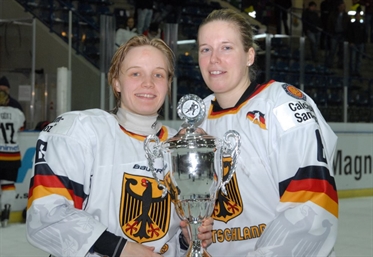Soldiers to the Olympics
Soldiers to the Olympics
Women's national team to fly the German flag in Sochi

 Monika Bittner and Bettina Evers represent two generations on the German women’s national team that will go to Sochi 2014. Photo: Rudi Gebert / Der Neue Tag
Monika Bittner and Bettina Evers represent two generations on the German women’s national team that will go to Sochi 2014. Photo: Rudi Gebert / Der Neue Tag
Small town Weiden and the German women's national team proved to be the perfect match during the Final Olympic Qualification. Neither the town nor the team being in the limelight that often, both came together to create a festive atmosphere inside the Weiden Arena that spurred the hosts on to secure their tickets to Sochi 2014.
Rejoicing out on the ice to celebrate next year's Olympic participation were forwards Monika Bittner and Bettina Evers, both of whom played an integral part in Germany's success can now look forward to Sochi, a destination they will be travelling to with a somewhat different outlook.
"It's a dream come true for me to go to my first Olympics. That's what we fight for, and that's the best you can get ," said 25-year-old Bittner, whose important opening goal set the tone in Germany's 3-1 win over the Czech Republic that sealed qualification for the country’s third Olympic tournament following previous appearances in 2002 and 2006.
While Bittner is looking forward to her maiden Olympic voyage, Evers will be aiming to finishing her third Winter Games on a high. Being the most represented player in the colours of the German national team, Sochi will most likely be 31-year-old Evers' farewell Olympic appearance in a sport that has developed a great deal since her debut on the big stage during the 1999 Women’s World Championship in Finland.
"The game is lot faster now for sure and the physical part is getting more and more important as are the tactics," she said. "Back all those years ago we didn't have a lot of players to choose from. Now we have really good ones coming through from the under-18 team," said Evers who is only a few games shy of her 300th appearance for Germany.
Continue readingWith nearly seven years between them, Bittner and Evers – linemates both for country and for club team ESC Planegg – are part of a German hockey generation whose careers have benefited greatly thanks to the assistance from an unlikely ally – the German Ministry of Defence.
Sportförderung der Bundeswehr, literally Sports Promotion of the Federal Army, is a program supporting top athletes in Germany. With roughly 700 participants from a wide array of sports, women's hockey was included into the program in 2001 to give the team a boost following Germany's first ever qualification for an Olympic women’s ice hockey tournament.
Directly employed and paid for by the Ministry of Defence, athletes are exempt from conventional army duties and are instead part of a Sports Development Group, which offers them time to wholeheartedly focus on their sport while earning an income.
Based at the National Training Centre for the Germany Ice Hockey Association in Füssen near the Austrian border, Evers, who holds the rank of Staff Sergeant, and Private First Class Bittner are currently two out of seven female hockey players taking part in the program normally lasting a couple of years, but which can get extended furhter for another two to four years.
The Germany Ice Hockey Association, already grateful for the program, now harbours hope that the recent qualification to the Winter Olympics can further increase the quota of players in order to further develop the game.
Having taken over the reigns as head coach in the summer of 2002, Peter Kathan guided Germany's women to a solid fifth-place finish during the Olympics in Turin 2006. But with twelve players hanging up their skates following that tournament, replacing them was never going to be easy, and the effects from a long post-Olympics hangover got Germany relegated from the top division of the Women’s World Championship in Harbin, China in 2008.
After dropping down to Division I, Kathan was asked to bring younger players into the team and three years later Germany climbed back up to the top division again. Finishing seventh in last year's return, and with good development within the under-15 and under-18 teams things are seemingly on the up. Kathan, however, would like to see women's hockey get a proper chance to develop in Germany.
"I have a national team of hard workers, but a lot still remains to be done with the hockey specifics, like skating and stickhandling in order for us to be at the very top level," he said. "But this is not the fault of the players, as most of them have almost no ice time. Many of the Bundesliga clubs have one hour of ice time a week, and sometimes they are only able to use one third of the ice, which are not conditions worthy of an Olympic team," said Kathan, who needs to finish at least sixth in Sochi in order for the team to continue to receive financial support from the very top.
"It is ok with performance pressure, but the ones making the decision within the government have no idea about the sport. They need to know that Canada, USA, Sweden and Finland spend more money, have more players and are quite simply better than us. They drive a Porsche, we drive a Volkswagen, so it is obvious who will win the race. But when the ones driving the Porsche continue to get support and the ones with the Volkswagen might not, then we will need 100 years to catch up," he said.
Now in his eleventh season at the helm, next major challenge for Kathan and the German team will be during the World Championship, played in Ottawa, Canada, 2-9 April 2013, where he once again will expect a big shift from his goalies, all three of whom play with men's teams.
But with the men's team missing out on qualification for Sochi, the women's team hopes the Winter Olympics might help them to catch attention and win a few more hearts beyond the Weiden Arena.
Meanwhile, while Bittner is unaware of what to expect once the Olympic starts in February next year, Evers will be able to tell her line-mate all about it as her Olympic swansong looms:
"The whole surroundings, meeting all these people who are interested in our sport, having spectators at the games which we are not used to in Germany, so there is no better thing being at the Olympics as an athlete. All the hard work just pays off, and this time I will make the most of to try and enjoy it," she said.
Back to Overview







































